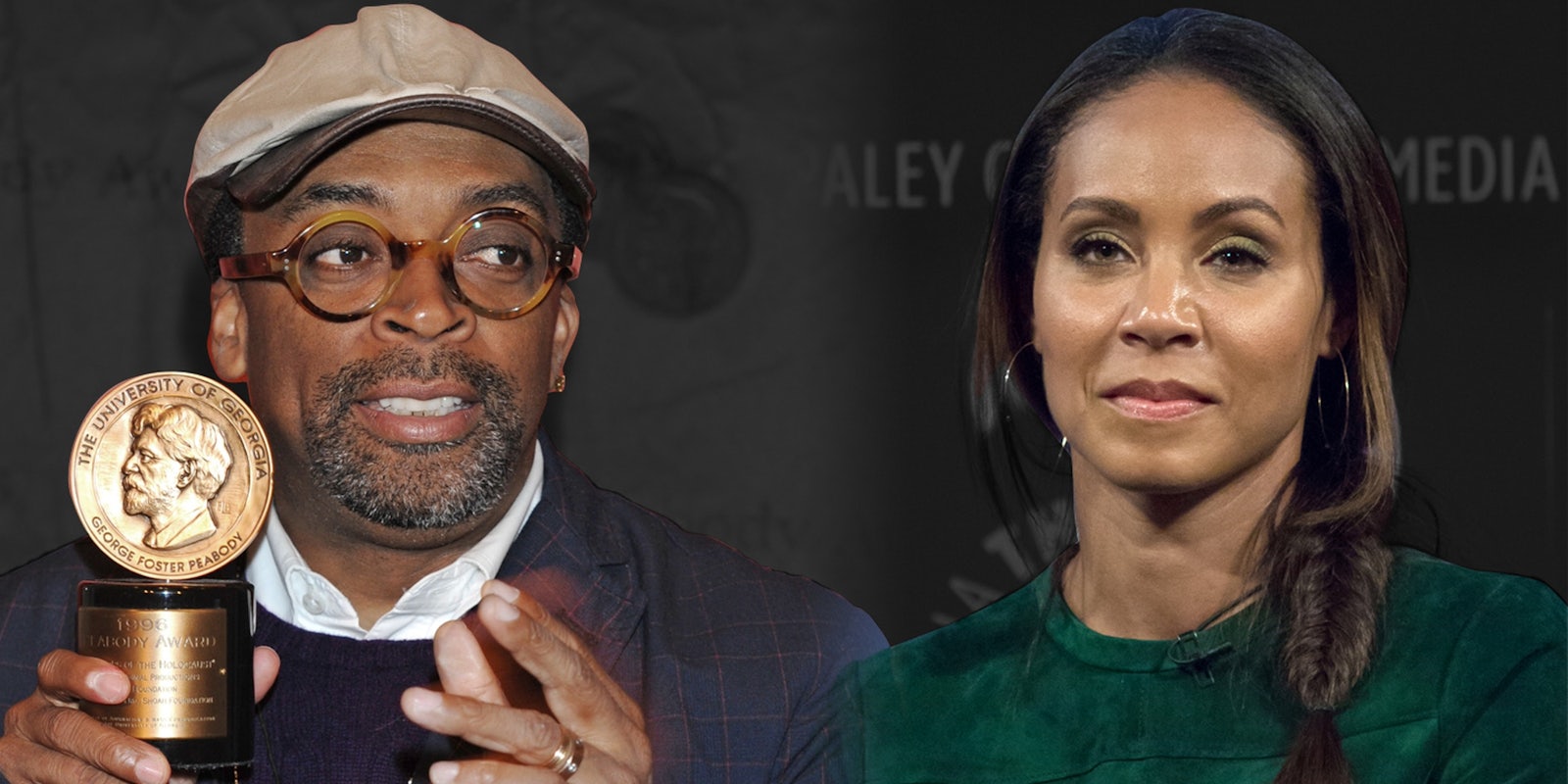This year’s Oscars will have at least two fewer people in attendance as a direct result of the lack of diversity among the nominees.
After the nominations were announced last week, much of the Internet has skewered the Academy of Motion Picture Arts and Sciences with #OscarsSoWhite, a hashtag April Reign started last year. All of the acting nominees were white actors and actresses the second year in a row; outside of director Alejandro González Iñárritu (The Revenant), the majority of nominations behind the camera were given to white moviemakers too. In the cases of Straight Outta Compton and Creed, two films about people of color, the only nominations went to white people.
Actress Jada Pinkett Smith mulled the idea of boycotting the ceremony over the weekend in a series of tweets, noting that while people of color are welcomed at the Oscars, they’re rarely ever recognized; her husband Will Smith was overlooked in his role for Concussion.
At the Oscars…people of color are always welcomed to give out awards…even entertain, (pt. 1)
— Jada Pinkett Smith (@jadapsmith) January 16, 2016
But we are rarely recognized for our artistic accomplishments. Should people of color refrain from participating all together? (pt 2)
— Jada Pinkett Smith (@jadapsmith) January 16, 2016
People can only treat us in the way in which we allow. With much respect in the midst of deep disappointment.
— Jada Pinkett Smith (@jadapsmith) January 16, 2016
J (pt 3)
She confirmed that she wouldn’t be attending or watching the Oscars after no people of color were nominated in the top categories with a Facebook video posted on Martin Luther King Jr.’s birthday. She told viewers that people of color “can no longer beg for the love, acknowledgement, or respect of any group.”
“Begging for acknowledgement or even asking diminishes dignity,” she said. “It diminishes power and we are a dignified people and we are powerful. And let’s not forget it. So let’s let the Academy do them with all grace and love and let’s do us differently.”
Director Spike Lee, who received an honorary Oscar from the Academy last year, also announced that he would be boycotting the ceremony; his most recent film, Chi-Raq, didn’t receive any nominations from the Academy. In a lengthy Instagram post featuring a photo of King, he thanked the Academy for the honor while directing his criticism towards the lack of diversity among the nominees.
“I Am Most Appreciative. However My Wife, Mrs. Tonya Lewis Lee And I Will Not Be Attending The Oscar Ceremony This Coming February,” Lee wrote. “We Cannot Support It And Mean No Disrespect To My Friends, Host Chris Rock and Producer Reggie Hudlin, President Isaacs And The Academy. But, How Is It Possible For The 2nd Consecutive Year All 20 Contenders Under The Actor Category Are White?”
Lee noted that the “real” battle isn’t at the Academy Awards; it’s with Hollywood executives at movie studios and TV and cable networks. Quoting Leslie Odom Jr.’s character Aaron Burr in Hamilton, Lee said that people of color just want to be in the room where it happens, and until they are, the nominations will remain “Lilly White.”
The lack of diversity among the nominees is so noticeable that even Academy president Cheryl Boone Isaacs noted her frustration while praising the films and people who did get nominations
“Of course I am disappointed, but this is not to take away the greatness (of the films nominated),” she told Deadline. “This has been a great year in film, it really has across the board. You are never going to know what is going to appear on the sheet of paper until you see it. We have got to speed it up.”
Meanwhile, Oscar host Chris Rock—who people expect to mock #OscarsSoWhite in his monologue—has already offered a bit of commentary as he posted a video to one of his Oscar promos, calling it the “White BET Awards.”
The #Oscars. The White BET Awards.https://t.co/8qjLR0uysI
— Chris Rock (@chrisrock) January 15, 2016
Update 7:30am CT, Jan. 19: David Oyelowo (Selma) sounded off on the topic at a gala hosted in honor of Academy President Cheryl Boone Isaacs: “This institution doesn’t reflect its president and it doesn’t reflect this room. I am an Academy member and it doesn’t reflect me, and it doesn’t reflect this nation.” He implored the Academy to find a way to fix its broken system, “because it is the zenith, it is the epitome, it is the height of celebration of artistic endeavor within the filmmaking community.”
For her part, Isaacs issued a statement Monday that acknowledged she was “both heartbroken and frustrated about the lack of inclusion.”
Photos via Dominick D/Flickr (CC BY 2.0) | Peabody Awards/Flickr (CC BY 2.0) | Remix by Jason Reed


